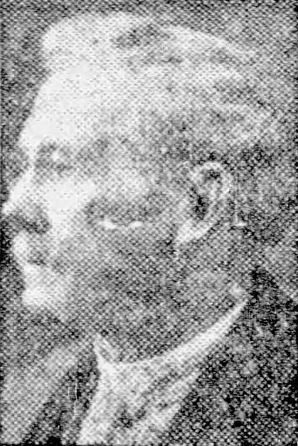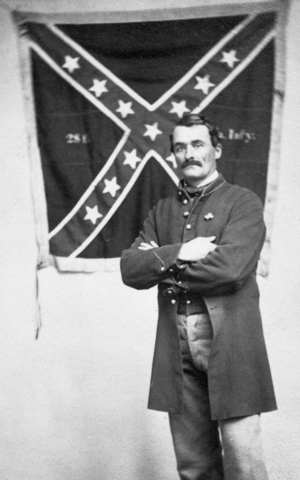Joseph H. De Castro was the first Hispanic American to be awarded the United States's highest military decoration for valor in combat—the Medal of Honor—for having distinguished himself during Pickett's Charge in the Battle of Gettysburg of the American Civil War.

Richard Conner was an American Civil War Union Army soldier who received the Medal of Honor for his bravery in action.
Francis Asbury Wallar was a Union Army volunteer in the American Civil War and received the Medal of Honor for actions on the first day of the Battle of Gettysburg, July 1, 1863. He was a corporal in Company I of the 6th Wisconsin Infantry Regiment, in the Iron Brigade of the Army of the Potomac. During the battle, he engaged a Confederate soldier of the 2nd Mississippi Infantry Regiment in single combat, capturing him and seizing his battle flag.

Richard Enderlin was a musician and United States Army soldier who received a Medal of Honor for the heroism he displayed when fighting in the Battle of Gettysburg in 1863.

James Richmond was a Union Army soldier in the American Civil War and a recipient of the U.S. military's highest decoration, the Medal of Honor, for his actions at the Battle of Gettysburg.
Morris Brown Jr. was an American soldier who received the Medal of Honor for valor during the American Civil War.
Sergeant George Henry Doré was an English soldier who fought in the American Civil War. Doré received the United States' highest award for bravery during combat, the Medal of Honor, for his action during the Battle of Gettysburg in Pennsylvania on 3 July 1863. He was honored with the award on 1 December 1864.

Benjamin H. Jellison was an American soldier who fought in the American Civil War. Jellison received his country's highest award for bravery during combat, the Medal of Honor. Jellison's medal was won for his heroism at the Battle of Gettysburg, Pennsylvania on July 3, 1863. He was honored with the award on December 1, 1864.

Edward M. Knox was a Union Army soldier in the American Civil War who received the U.S. military's highest decoration, the Medal of Honor.

Joseph C. Hibson was a Union Army soldier in the American Civil War who received the U.S. military's highest decoration, the Medal of Honor.
Moses C. Hanscom was a Union Army soldier in the American Civil War who received the U.S. military's highest decoration, the Medal of Honor.

Philip Goettel was a Union Army soldier in the American Civil War who received the U.S. military's highest decoration, the Medal of Honor.

The 126th New York Infantry Regiment was an infantry regiment in the Union Army during the American Civil War.

John W. Wagner was a Union Army soldier in the American Civil War who received the U.S. military's highest decoration, the Medal of Honor.

Thomas Horan was an Irish-American soldier who fought with the Union Army in the American Civil War. Horan received his country's highest award for bravery during combat, the Medal of Honor, for actions taken on July 2, 1863, during the Battle of Gettysburg.
John G. Miller was an American soldier who fought with the Union Army in the American Civil War. Miller received his country's highest award for bravery during combat, the Medal of Honor, for actions taken on July 3, 1863 during the Battle of Gettysburg.
John H. Robinson was an Irish soldier who fought with the Union Army in the American Civil War. Robinson received his country's highest award for bravery during combat, the Medal of Honor, for actions taken on July 3, 1863 during the Battle of Gettysburg.
Oliver P. Rood was an American soldier who fought with the Union Army in the American Civil War. Rood received his country's highest award for bravery during combat, the Medal of Honor, for actions taken on July 3, 1863, during the Battle of Gettysburg.

Marshall Sherman was an American soldier who fought with the Union Army in the American Civil War. Sherman received his country's highest award for bravery during combat, the Medal of Honor, for actions taken on July 3, 1863, during the Battle of Gettysburg.
James Wiley was an American soldier who fought with the Union Army in the American Civil War. Wiley received his country's highest award for bravery during combat, the Medal of Honor, for actions taken on July 3, 1863 during the Battle of Gettysburg.










